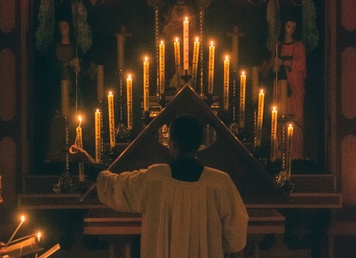
Seminarian Aaron Dunn admits he experiences what many call holy envy. He believes the desire to witness the depth, richness, and beauty of another faith tradition is a good place to start interreligious work—but he argues that it shouldn’t end there.
Dunn likens the longing of holy envy to having a college best friend who has another friend from high school who you aren’t close with—the relationship is just different.
“When you’re in a space watching worship happen that’s not your faith language, it’s kind of like you have a best friend from college (God) and that friend has a best friend from high school that you don’t know.
“You notice that they have all these inside jokes and a unique way of communicating with one another. And you’re like, ‘I wish I was in on the joke.’ But then you realize, ‘Wait, I have my own inside jokes and my own special relationship with my friend.’”
He felt this holy envy in his work at a Jewish day school while studying in seminary. Dunn attended shul and Shabbat dinners as a guest, and it was in those moments of watching others worship in a different “faith language” that birthed his longing.
“I was watching this way of communicating with God that had been lacking in my faith life up to that moment,” Dunn says. “My response was, ‘I wonder if I can find this in my own faith tradition.’ Holy envy was a way for me to dive into my own tradition as inspired by the faiths around me.”
Now, as a postulant for Holy Orders towards the priesthood for the Episcopal Diocese of Washington, he believes he’s found a version of what he admires in his Jewish colleagues. Dunn sees his experience at the Jewish day school as his call to action, as he wanted to be involved in the students’ spiritual lives.
“Holy envy wasn’t enough. I wanted to not just find my own faith language, but I wanted to be able to engage with my students using their faith language.
“I actively learned not just dialogue skills, but translation skills. Translation was a way for me to transcend boundaries, caring for those that use other faith languages by using their own faith language while still remaining true to my own faith identity.”
Dunn believes that translation work is a fruit of dialogue and that the process of relating to and being present with one another interreligiously is contingent upon the act of translating ideas. He found joy in understanding the religious language his Jewish students spoke and meeting them where they were.
“The translation work leads me to ask myself: How do I connect to this person and try to communicate my thoughts using what I’ve learned of the language of their faith without appropriating it, so it doesn’t sound like I’m trying to be [in] their faith?” he says. “That, in and of itself, was a great act of hospitality and solidarity. It wouldn’t have been possible without dialogue. Holy envy was a feeling of wanting for myself. Translation is wanting to give back and connect.”
Dunn also feels a sense of responsibility to address the myriad of issues he sees within Christianity, and he has a deep passion for “the dismantling work,” and “Christianity recognizing its role in the genesis of Antisemitism, anti-Judaism, and Islamophobia.”
Dunn reflects, “So much of what has brought me to the Priesthood is wanting these conversations to get to the very theological heart of my faith and my faith community. Until the interfaith conversations actually get into the theological DNA of my faith, I’m going to keep working and fighting to get there.”